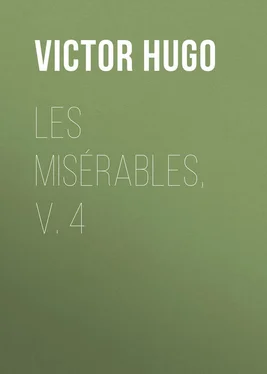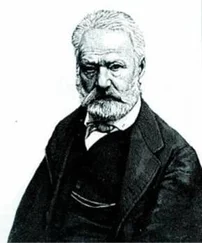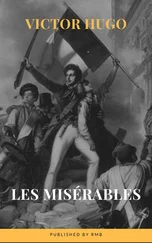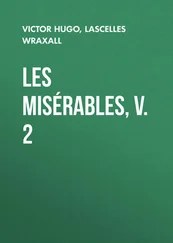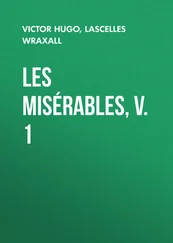Victor Hugo - Les Misérables, v. 4
Здесь есть возможность читать онлайн «Victor Hugo - Les Misérables, v. 4» — ознакомительный отрывок электронной книги совершенно бесплатно, а после прочтения отрывка купить полную версию. В некоторых случаях можно слушать аудио, скачать через торрент в формате fb2 и присутствует краткое содержание. Жанр: literature_19, foreign_antique, foreign_prose, на английском языке. Описание произведения, (предисловие) а так же отзывы посетителей доступны на портале библиотеки ЛибКат.
- Название:Les Misérables, v. 4
- Автор:
- Жанр:
- Год:неизвестен
- ISBN:нет данных
- Рейтинг книги:4 / 5. Голосов: 1
-
Избранное:Добавить в избранное
- Отзывы:
-
Ваша оценка:
- 80
- 1
- 2
- 3
- 4
- 5
Les Misérables, v. 4: краткое содержание, описание и аннотация
Предлагаем к чтению аннотацию, описание, краткое содержание или предисловие (зависит от того, что написал сам автор книги «Les Misérables, v. 4»). Если вы не нашли необходимую информацию о книге — напишите в комментариях, мы постараемся отыскать её.
Les Misérables, v. 4 — читать онлайн ознакомительный отрывок
Ниже представлен текст книги, разбитый по страницам. Система сохранения места последней прочитанной страницы, позволяет с удобством читать онлайн бесплатно книгу «Les Misérables, v. 4», без необходимости каждый раз заново искать на чём Вы остановились. Поставьте закладку, и сможете в любой момент перейти на страницу, на которой закончили чтение.
Интервал:
Закладка:
Victor Hugo
Les Misérables, v. 4/5: The Idyll and the Epic
BOOK I
SOME PAGES OF HISTORY
CHAPTER I
WELL CUT OUT
1831 and 1832, the two years immediately attached to the revolution of July, contain the most peculiar and striking moments of history; and these two years, amid those that precede and follow them, stand out like mountains. They possess the true revolutionary grandeur, and precipices may be traced in them. The social masses, the foundations of civilization, the solid group of superimposed and adherent interests, and the secular profiles of the ancient Gallic formations, appear and disappear every moment through the stormy clouds of systems, passions, and theories. These apparitions and disappearances were called resistance and movement, but at intervals truth, the daylight of the human soul, flashes through all.
This remarkable epoch is so circumscribed, and is beginning to become so remote from us, that we are able to seize its principal outlines. We will make the attempt. The Restoration was one of those intermediate phases which are so difficult to define, in which are fatigue, buzzing, murmurs, sleep, and tumult, and which, after all, are nought but the arrival of a great nation at a halting-place. These epochs are peculiar, and deceive the politician who tries to take advantage of them. At the outset the nation only demands repose; there is but one thirst, for peace, and only one ambition, to be small, – which is the translation of keeping quiet. "Great events, great accidents, great adventures, great men, – O Lord! we have had enough of these, and more than enough." Cæsar would be given for Prusias, and Napoleon for the Roi d'Yvetôt, who was "such a merry little king." Folk have been marching since daybreak and arrive at the evening of a long and rough journey; they made their first halt with Mirabeau, the second with Robespierre, and the third with Napoleon, and they are exhausted. Everybody insists on a bed.
Worn-out devotions, crying heroisms, gorged ambitions, and made fortunes, seek, claim, implore, and solicit, – what? A resting-place, and they have it. They take possession of peace, tranquillity, and leisure, and feel satisfied. Still, at the same time certain facts arise, demand recognition, and knock at doors on their side. These facts have emerged from revolutions and wars; they exist, they live, and have the right, – the right of installing themselves in society, which they do; and in the majority of instances facts are the quarter-masters that only prepare a billet for principles.
In such a case, this is what occurs to political philosophers: at the same time as wearied men claim rest, accomplished facts demand guarantees, for guarantees for facts are the same thing as repose for men. It is this that England asked of the Stuart after the Protector, and what France asked of the Bourbons after the Empire. These guarantees are a necessity of the times, and they must be granted. The Princes concede them, but in reality it is the force of things that gives them. This is a profound truth and worth knowing, which the Stuarts did not suspect in 1662, and of which the Bourbons did not even gain a glimpse in 1814.
The predestined family which returned to France when Napoleon collapsed had the fatal simplicity of believing that it gave, and that it could take back what it had once given; that the Bourbon family possessed the right divine, and France possessed nothing, and that the political right conceded in the charter of Louis XVIII. was nothing else but a branch of the divine right, detached by the House of Bourbon and graciously permitted to the people up to the day when the king thought proper to clutch it again. Still, from the displeasure which the gift caused it, the Bourbon family ought to have felt that it did not emanate from it. It behaved in a grudging way to the 19th century, and looked with an ugly smile at every expansion of the nation. To employ a trivial, that is to say, a popular and true phrase, it was crabbed, and the people noticed it.
The Government believed that it had strength because the Empire had been removed before it, like a stage scene; but it did not perceive that it had been produced in the same way, nor see that it was held in the same hand which had removed Napoleon. It believed that it had roots, because it was the past, and was mistaken: it formed a portion of the past, but the whole of the past was France; and the roots of French society were not in the Bourbons, but in the nation. These obscure and tenacious roots did not constitute the right of a family, but the history of a people, and were everywhere, except under the throne. The House of Bourbon had been for France the illustrious and blood-stained knot of her history, but was no longer the principal element of her destiny or the necessary basis of her policy. She could do without the Bourbons as she had done for two-and-twenty years: there was a solution of continuity, but they did not suspect it. And how could they suspect it, when they imagined that Louis XVII. reigned at the 9th Thermidor, and that Louis XVIII. was reigning at the day of Marengo? Never, since the origin of history, have princes been so blind in the presence of history and that portion of the divine authority which facts contain and promulgate. Never had the nether claim, which is called the right of kings, denied to such a condition the supreme right. It was a capital error that led this family to lay their hand again on the "granted" guarantees in 1814, or on the concessions, as they entitled them. It is a sad thing that what they called their concessions were our conquests, and what they called our encroachments were our rights. When the hour appeared to have arrived, the Restoration, supposing itself victorious over Bonaparte, and rooted in the country, that is to say, believing itself strong and profound, suddenly made up its mind, and risked its stake. One morning it rose in the face of France, and, raising its voice, contested the collective title, and the individual title, the sovereignty of the nation, and the liberty of the citizen. In other terms, it denied the nation what made it a nation, and the citizen what made him a citizen. This is the substratum of those famous decrees which are called the "Ordonnances" of July. The Restoration fell, and fell justly. Still, let us add, it was not absolutely hostile to all the forms of progress, and grand things were accomplished while it stood aloof. During the Restoration the nation had grown accustomed to calm discussion, which the Republic had been deficient in, and to grandeur in peace, which was not known under the Empire. France, strong and free, had been an encouraging example for the other nations of Europe. Under Robespierre the Revolution ruled; under Bonaparte, cannon; while in the reigns of Louis XVIII. and Charles X. the turn arrived for intellect to speak. The wind ceased, and the torch was re-illumined, while a pure mental light played round the serene crests. It was a magnificent, useful, and delightful spectacle; and for fifteen years those great principles, which are so old for the thinker, so new for the statesman, – equality before the law, liberty of conscience, freedom of the press and speech, and the accessibility of all fitting men to office, – could be seen at work in a reign of peace, and publicly. Things went on thus till 1830, and the Bourbons were an instrument of civilization which broke in the hands of Providence.
The fall of the Bourbons was full of grandeur, not on their side, but on that of the nation. They left the throne with gravity, but without authority; their descent into night was not one of those solemn disappearances which impart a sombre emotion to history, and it was neither the spectral calmness of Charles I. nor the eagle cry of Napoleon.
Читать дальшеИнтервал:
Закладка:
Похожие книги на «Les Misérables, v. 4»
Представляем Вашему вниманию похожие книги на «Les Misérables, v. 4» списком для выбора. Мы отобрали схожую по названию и смыслу литературу в надежде предоставить читателям больше вариантов отыскать новые, интересные, ещё непрочитанные произведения.
Обсуждение, отзывы о книге «Les Misérables, v. 4» и просто собственные мнения читателей. Оставьте ваши комментарии, напишите, что Вы думаете о произведении, его смысле или главных героях. Укажите что конкретно понравилось, а что нет, и почему Вы так считаете.
